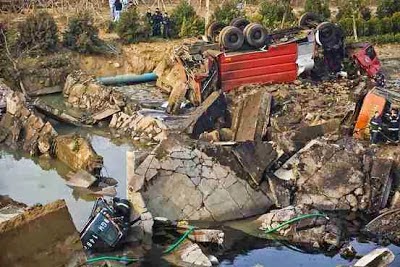Around 2.4 million people in the city of Lanzhou in northwest Gansu Province after an oil pipeline operated by the Lanzhou Petrochemical Co., a subsidiary of the China National Petroleum Corporation leaked into a water supply utilized by a plant operated by Veolia on Friday 11 April 2014. Tests found drinking water to contain 200 μg of benzine (a potent carcinogen) per liter, over 20 times the official national safety limit in China (also 200 times official safe levels in the EU and 40 000 times official safe levels in the US). This resulted in panic-buying of bottled water across the city, with retail supplies quickly becoming exhausted.
People queuing to purchase bottled water in Lanzhou, Gansu Province, on Friday 11 April 2014. AP.
Lanzhou (population 3.6 million) is a major industrial center, and has known environmental problems, being considered one of China's most polluted cities, as well as having been declared 'The 30th most polluted city in the world' by the Blacksmith Institute, though these assessments are generally based upon the cities poor air quality, which is affected not just by locally produced pollution but by wind-blown dust from the Gobi Desert. The air quality in Lanzhou is considered to be the worst of any major Chinese city, with air containing an average of 150 μg of suspended particulate matter per cubic meter, even worse than the 121 μg per cubic meter suffered in Beijing.
The approximate location of Lanzhou. Google Maps.
See also...
Follow Sciency Thoughts on Facebook.





